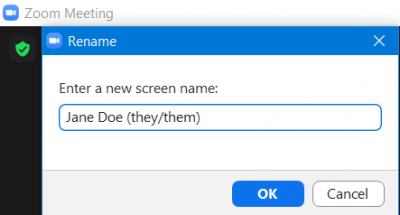
As remote learning cements its role in higher education, students who are transgender and nonbinary say the Zoom format presents unique challenges as well as benefits.
One advantage Zoom offers is the ability to change the personal names that appear underneath a user’s video, said Cas Berta, a senior in Boston University’s College of Communication.
“I do like the fact that I can have my name and my pronouns right there,” Berta said, “and there’s no way you can ignore it.”
Another benefit to taking classes on Zoom, Berta said, is no one can make perceptions of them based on the appearance of their chest. With the limited camera view, they said, nobody can see what they don’t want them to see.
“We don’t have to think a lot about our bodies because of Zoom,” Berta said. “I just really, really appreciate that I’m just a floating head, which is a lot of times what my dysphoria makes me want to be.”
For a sophomore at BU, the transition to Zoom has provided certain challenges. Despite including pronouns next to their name on Zoom, this student said they have been misgendered when their camera is turned off due to professors not looking at their name and instead going off of the sound of their voice.
“It’s not really their fault,” they said, “because they have to focus both on the in-person audience and also the online audience, and then what they’re teaching at the same time.”
Evan Gilbert, a junior in the College of Arts and Sciences, is the social media coordinator for BU’s Queer Activist Collective, known as Q. He said the University has been “surprisingly” helpful in aiding transgender students who wish to change their information.
Q offers resource guides, created to help students navigate the many sites available to LGBTQ students. These guides span a variety of topics.
“There’s a COVID-19 resource guide,” Gilbert said, “and then there’s also a guide specifically just for trans or gender nonconforming people with all the on-campus resources for how to go through the process of updating your name and all that.”
Tyler Celli, a junior in CAS, said the University has a responsibility to better distribute more resources on how students can change their name and general information in BU’s system.
Though he expects it might be costly to reconfigure BU’s student identification system to make it easier for transgender and nonbinary students to change their information, Celli said BU has focused its resources on projects students did not ask for, such as renovating 808 Commonwealth Avenue and constructing the Center for Computing and Data Sciences
“This has been a problem for years and years that still seems to get pushed to the side and swept under the rug,” Celli said. “It feels a little disheartening sometimes.”
Berta said if BU students’ actual names and pronouns were already in the roster system, professors wouldn’t be deadnaming students — referring to a transgender person by the name they no longer use.
Celli said manually changing names can become complicated for those who still have their deadname listed in Blackboard.
“I’m sure a lot of students are logging into Zoom early and switching their name on Zoom before the meeting starts, which must be so frustrating and anxiety-inducing,” Celli said. “What if it doesn’t work? Or what if I don’t get there in time?”
At the beginning of each semester, one student sends an email to their teachers introducing themselves and explaining “they” and “them” pronouns with resources on how to conjugate them. They said it feels as though few faculty members at BU have met nonbinary people who use these pronouns.
“Sometimes it just feels like I’m the token ‘they, them,’ nonbinary, trans person in every class,” they said. “I have to be the one that advocates for myself.”
While displaying pronouns on Zoom can help clear the air, not everyone may feel comfortable doing so.
Gilbert said he personally doesn’t display his pronouns on Zoom because he does not want to out himself. However, he said the practice of including one’s pronouns on the platform is a “great” idea.
“It should be more of an institutionalized idea and a requirement, maybe,” Gilbert said, “and led by cis, non-LGBTQ people.”
Celli, however, said the idea of all students and faculty placing pronouns next to their names on Zoom should remain optional. He said the way cisgender people would feel about doing so might contrast with the starker fears the transgender and non-binary community could experience.
“I think for trans students, it could pose a problem for some of us,” Celli said. “If you’re not out yet, or you’re still figuring yourself out, to display your pronouns might feel pretty vulnerable.”
Berta said the inclusion of pronouns next to students’ names on Zoom would help with normalization of the practice and could prove to be beneficial for the BU community during increasingly strange times.
“I think in the age when we’re all trying to be as connected as possible, and we’re trying to know as much about each other as we can in these tiny, scary Zoom boxes,” Berta said, “having pronouns is helpful.”





Great article. I really feel for these students. I am happy to hear that BU is making it easier for them to conform their IDs to their chosen names and pronouns. I know everyone has their own comfort level with being “out” and with being an advocate for self and others. It takes a lot of courage and energy to be the one educating and breaking down barriers. It has always been so, and the hope would be that others of all gender identities would ally with the trailblazers to help shoulder the burden and to alleviate some of the fear associated with being trans or gender non-conforming. As a cisgender woman, it is hard to imagine the discomfort that gender dysphoria and daily confrontations with a world that doesn’t understand or recognize something that is so seemingly fundamental to one’s identity. I experience shades of it as a woman in a masculine dominant culture, but there are many more outspoken allies for cisgender women right now that there seem to be for those whose gender identity is considered novel or foreign. Keep up the good fight!